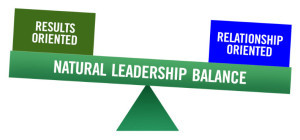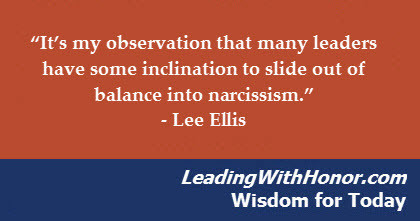Lee Ellis's Blog, page 279
March 18, 2016
Leading with Honor Wisdom for Today, March 18, 2016
“It’s my observation that many leaders have some inclination to slide out of balance into narcissism.” – Lee Ellis


March 17, 2016
Happy St Patrick’s Day – Celebrating This Religious Leader
 Saint Patrick is a leader with some staying power as evidenced by the annual remembrance of his life and death. Take a moment and learn more about this religious leader from Wikipedia –
Saint Patrick is a leader with some staying power as evidenced by the annual remembrance of his life and death. Take a moment and learn more about this religious leader from Wikipedia –
Saint Patrick (Latin: Patricius; Irish: Pádraig [ˈpˠaːd̪ˠɾˠəɟ], Old Irish: Cothraige) was a fifth-century Romano-British Christian missionary and bishop in Ireland. Known as the “Apostle of Ireland”, he is the primary patron saint of Ireland, along with saints Brigit of Kildare and Columba. He is also venerated in the Anglican Communion, the Old Catholic Church and in the Eastern Orthodox Church as equal-to-apostles and the Enlightener of Ireland.[2]
The dates of Patrick’s life cannot be fixed with certainty but, on a widespread interpretation, he was active as a missionary in Ireland during the second half of the fifth century.[3] Early medieval tradition credits him with being the first bishop of Armagh, Primate of Ireland.
According to the Confessio of Patrick, when he was about 16, he was captured by Irish pirates from his home in Great Britain, and taken as a slave to Ireland, looking after animals, where he lived for six years before escaping and returning to his family. After becoming a cleric, he returned to northern and western Ireland. In later life, he served as a bishop, but little is known about the places where he worked. By the seventh century, he had already come to be revered as the patron saint of Ireland.


Fill-in-the-Blank – “The best way to stay humble as a leader is to __________________.”
Fill-in-the-Blank – “The best way to stay humble as a leader is to __________________.”
Please share your answer in this forum – thank you!


March 16, 2016
When Leadership Strengths Get Out of Balance – Check Out This List
 Here’s what strong leadership strengths become when get they get too out of balance –
Here’s what strong leadership strengths become when get they get too out of balance –
Confident – Self-centered, talk mainly about their agenda, discount others
Decisive – Opinionated–sometimes wrong but never in doubt
Initiating – Too aggressive to get what they want
Outgoing – Need to be the center of attention
Accurate – React strongly to constructive feedback
Take Charge – Controlling, believing that they are smarter, superior
Strategic – Manipulative of others to get what they want
Logical and Objective – Insensitive to the feelings and needs of others
Visionary – Blame others when something goes wrong
Now if you have a strong, confident personality, you may lack self-awareness of these unbalanced traits when you look in the mirror, but others notice them. Evaluate how many of these struggles show up in your thoughts and behavior and imagine how others experience you.
And, please share your comments on this list, too – your wisdom is valuable!
Also, read Lee’s entire article on this topic in our blog.


How to Mitigate Emotional Hijacking: Offensive and Defensive Strategies
 (Editor’s Note: This month, we’re featuring a guest article from physicians and healthcare coach, Jane Thilo, on this important topic. It’s timely advice for leaders in all industries.)
(Editor’s Note: This month, we’re featuring a guest article from physicians and healthcare coach, Jane Thilo, on this important topic. It’s timely advice for leaders in all industries.)
By Jane L. Thilo, MD, MS, JThilo & Associates, Mercer Island, WA
Despite the packed schedule, the morning is off to a great start and the team is working together seamlessly. The admitting nurse is joking with patients as they get ready for surgery. The first patients of the day are already sipping juice in recovery. THIS is going to be a terrific day!
In walks Dr. X muttering under his breath that someone has parked in “his” spot. He stalks toward the dressing room people exchanging uneasy glances in his wake. When asked for the consent, he rants about the incompetence of everyone from his office to the Center.
His room starts late, his gloves are the wrong brand, the scrub nurse drops a critical instrument, the scissors are dull, the patient moves, the nurses are slow, the staff is drawing straws to see who has to go in to give their buddies a lunch break, and on and on through five cases. By the end of the day, EVERYONE in the Center, including the business office is exhausted, crabby and wondering why they ever thought it was fun to work at AnyPlace Surgery Center.
If any part of this scenario sounds familiar to you – and I’d be surprised if it didn’t, you’ve been the victim – or maybe even the perpetrator of an emotional hijacking! Recent advances in the science of neuroaffective behavior have vastly increased our understanding of how the emotional, or feeling centers of the human brain tie into the cognitive, or thinking centers to influence our behavior.
The key lies in the structure and function of the limbic system-seat of human emotion and one of the oldest parts of the human brain. Unlike the circulatory system and other closed loop self-regulating systems, the limbic system is an open loop system and relies on interaction with limbic systems of other humans to regulate itself.
Scientists describe this powerful phenomenon as “interpersonal limbic self-regulation.” Studies have shown the power of this interpersonal system to alter hormone levels, cardiovascular function, sleep rhythms and even the immune system of another person (Goleman 2002, pp. 6-7).
For the most part, this is a very effective design, for example when a mother needs to soothe her crying child. But in the scenario described above, the emotional behavior of the ranting physician hijacks the emotions of the entire facility resulting in stress and anxiety that negatively impact team performance and patient care.
This physician is lacking in emotional intelligence – the ability to recognize and manage his own emotions and the emotions of others – a critical competence for people in positions of authority and leadership.
AN OPEN LOOP SYSTEM
The open loop system of the emotions plays a significant role in the influence that both formal and informal leaders have over their followers. Because followers look to their leaders for cues on how to behave, a leader’s mood and leadership style play a powerful role in setting the tone of the environment. Just about anyone who has worked in the operating room has witnessed the effect of a physician like our Dr. X described above who, without saying a word can set the entire team on edge and negatively impact team performance.
Fortunately, the opposite holds true as well. Most of us have been part of a team where the leader sets a positive tone by telegraphing a resonant style of leadership – one that encourages self-confidence, compassion, empathy, initiative, collaboration and teamwork.
Because surgery and especially the management of medical emergencies demands high performance teamwork, in my view, the successful outcome depends as much on the emotional intelligence of the team leader as it does on his or her cognitive knowledge and technical skills.
AUTHORITY AND INFLUENCE
In almost every setting, the role of a physician carries along with it formal authority – the authority that comes automatically with title, position and training. Most physicians also possess informal authority as well which comes as a result of respect, trust, appreciation and affection. Like it or not, in almost every situation, we as physicians have significant authority and therefore wield a strong influence over the emotions of those working for us and with us. Consequently we have a significant impact on team performance over and above our own individual performance.
This is one of the major reasons physicians and anyone else who is in a leadership position would be wise to pay attention to the growing body of literature on emotional intelligence.
EMOTIONAL LEARNING
Exciting new research in the field of affective neuroscience is beginning to uncover how the brain thinks and learns. Mastery of cognitive skills such as memorization of the cardiac arrest algorithms or how to calculate drug doses requires explicit learning which can be taught in a classroom or learned from a book. This type of learning occurs in the neocortex. Effective leadership however, relies on the emotional competencies which require implicit learning, the same process we use to strengthen or break a habit. This type of learning occurs in the older part of the brain — the limbic system. (Goleman et al, 2002)
Implicit learning is ongoing and occurs for the most part unconsciously throughout life as we try new things, get rewarded for what is effective, then continue to reinforce those behaviors until they become unconscious habits. Most of us learn our leadership skills haphazardly as we go through life, paying little attention to what we are learning. Dissonant leadership styles, for example, “command and control” (captain of the ship) or “pacesetting” (expect and exemplify excellence), are often modeled, reinforced and rewarded in the competitive environment and hierarchical culture of premed and medical school and residency.
These styles may be incorporated as a set of habitual behaviors that become unconscious regardless of how well they work in subsequent situations. But today, these potentially dissonant styles are no longer effective in most situations. They should be used sparingly and in conjunction with more resonant styles, especially in the surgery center where teamwork is essential.
ARE YOU A DR. X?
It’s often difficult to recognize this type of behavior in oneself because few people like Dr. X have stopped long enough to question their own role in the above scenario. If you have any of these thoughts and feelings on a frequent basis, they could be a warning sign that you have room to improve your emotional intelligence competencies:
People don’t appreciate you or understand how hard you work.
Few people measure up to your expectations.
You believe most people are incompetent.
You have high employee turnover in your office/surgery center staff.
Things always seem to go wrong on your cases.
You have refused to work with one or more nurses or physicians.
You have had some disciplinary action against you.
If any of these sound familiar, it’s probably time for some real soul searching. First ask yourself whether you are living the life and getting the results you want. If not, then perhaps it’s time to take a hard look in the mirror at your own leadership style and take some steps toward change. Accurate self-assessment is one of the most important emotional competencies to master.
DEVELOPING EMOTIONAL COMPETENCIES
Research has shown that adults can develop the emotional competencies of effective leadership and to the extent that they do, their ability to lead effectively will improve. The process however is not easy.
Unlike cognitive skills, emotional competencies cannot be learned in a weekend workshop or simply by reading about them in a book. They take months of focused attention, not days. The development of emotional competencies is similar to unlearning old habits and developing new ones to replace them. First, the ineffective behavior must be brought into the awareness. Next, a new or more effective behavior must be identified and finally the new behavior must be consciously rehearsed over and over until it is mastered and becomes unconscious. (Goleman, 2002 et al.)
Emotional learning occurs most rapidly when the person creates a strong support system for him/herself through a mentor, coach or group of peers who will give accurate feedback and are invested in the learner’s success. Though it does take time, the payoff for developing emotional intelligence is high and well worth the effort. Emotionally intelligent leaders experience a greater sense of well-being, improved relationships, happier employees and lower employee turnover, better team work, greater job satisfaction and a greater degree of business success.
While physicians like Dr. X are the exception rather than the rule, most of us have the occasional bad day where we come to work in a funk and may not even realize the impact we have on the rest of the team. Fortunately most physicians have a relatively high level of emotional competence, but because of the degree of authority and influence that comes along with the role of physician, I believe all physicians would benefit from developing more competencies in emotional intelligence.
JT
ABOUT DR. THILO
Dr. Thilo coaches physicians and healthcare executives aspiring to build competence in the skills required to lead organizations in turbulent times. She works with organizations to create alignment between strategy, people, processes and customers, to restore a sense of purpose and build a performance culture dedicated to achieving business results. To learn more about how you can develop a culture of emotionally intelligent leaders in your organization, contact Dr. Jane Thilo; Jane@JaneThilo.com ; 206-232-3201.
Assess and Develop Your Natural Leadership Strengths and Struggles

Part of understanding your Leadership Behavior DNA is knowing your Results vs Relationships balance.
Based on more than 30 years of research and experience in developing leaders, Leadership Behavior DNA™, led by leadership consultant, coach, and trainer Lee Ellis, focuses on some of the key behavioral issues of leadership, helping managers understand their unique strengths and struggles. With this awareness, they can adapt
their leadership style to help each person reach their full potential.
Simply put, we know how to help you and your team discover their personal leadership style. Learn More and download a free report.
REFERENCES AND FURTHER READING
Goleman, D., Boyatzis, R. & McKee, A. (2001) Primal leadership: The hidden driver of great performance. The Harvard Business Review, December, 42-51.
Goleman, D., Boyatzis, R. & McKee, A. (2002) Primal Leadership: Realizing the power of emotional intelligence. Boston: Harvard Business School Press.


March 14, 2016
Today is a Special 43rd Anniversary – Celebrate with Us
Today (and every year), we celebrate the 43rd Anniversary of Operation Homecoming where Lee and his comrades were released from the POW prison camps of Vietnam.
Please join us in celebrating this historical marker—below is a clip from 2013 celebration event held at the Nixon Foundation –


March 13, 2016
On This Day in Leadership History, March 13, 2016
On this day in leadership history in 1901, Andrew Carnegie announced that he was retiring from business and that he would spend the rest of his days giving away his fortune. His net worth was estimated at $300 million. One year later in 1902, Andrew Carnegie approved 40 applications from libraries for donations (as just one example).
What’s the leadership lesson? Part of honorable leadership is having an active attitude of generosity—a mindset that goes beyond your own personal needs. The lasting essence of building a legacy is being generous! Pay it forward and give.
 Andrew Carnegie – Wikipedia
Andrew Carnegie – Wikipedia


March 11, 2016
Leading with Honor Wisdom for Today, March 11, 2016
March 10, 2016
3 Reasons Millennials Are Getting Fired – An Inc.com Article
What’s this growing trend with 18-34 year olds getting fired? Bottom line—employers are fed up with the Millennial generation’s work attitude and ethics. Please read more from Inc.com, but the 3 takeaways are –
Employers don’t want to be parents.
The anti-work attitude isn’t appreciated (or tolerated).
Millennials’ happiness isn’t the employer’s responsibility.


March 9, 2016
A Quick Leadership Pep Talk – Staying On Course
A Quick Leadership Tip From Lee Ellis – how can you consistently make a difference everyday in helping your team or organization lead and work with honor? This 2-minute clip is a great pep talk on keeping you on course as we progress through 2016.
Please watch and share your comments – thank you!











